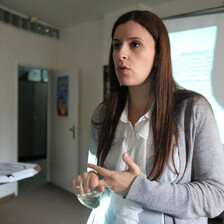14 February 2008
For a while now, we’ve been talking about it. For a while now, I’ve been talking about it. Yes, there will be another war. I have said so during radio interviews, during dinner conversations, during phone calls with my family in the US. Yes, there will be another war of Israeli aggression on Lebanon. It is just a question of time, this summer or next summer, this year or next year, but, yes, there will be another war.
Why are we talking of war? There are the constant rumblings from Israel, the rumblings of an arrogant, expansionist military power that was defeated and refuses its defeat. Hard to deny the comings of another war when we have our history with Israel showing us a series of wars every few years, and when the Israeli government continues to issue promises and preparations for another war against Lebanon. Talk of war has thus become quite regular, more common than talk of the weather. There are also the domestic rumblings, the cries from sect leaders Walid Jumblatt, Saad Hariri and Samir Geagea in which they rather openly state “bring it on” in their references to a possible civil war. Nevertheless, while we talk about the probabilities of a civil war, we only talk about the timing of an Israeli war. We are certain of that war.
I’ve spoken quite casually about it. I’ve remarked that we need to start preparing for relief work from now. Emergency preparedness, a friend said to me last night during another one of our meetings. We call it emergency preparedness; it is easier to swallow that way.
We’ve talked about it while we’ve ordered pizza, continued with our work, and organized more seminars and outreach efforts.
But I didn’t feel the magnitude until tonight.
Another war. Another Israeli war.
We have yet to rebuild what was destroyed in 2006. Perhaps a war sooner than later then would be better — why rebuild it this year only to have destroyed next year? I try to make light of it. We all try to make light of it. But I ask myself tonight, what to do? Truly, what to do?
If, no when, there will be another war, it will be more vicious, more destructive. Each war has been more destructive than one before. Each war has included more massacres than the last.
For the past few days, my body has been aching, a kind of ache that is quite internal. My lower hips. My lower back. A continuous sense of nausea. A pounding in my head. For the past few days, my body has been aching to cry while my mind has been confused as to the source of this sadness. I’ve been driven to tears at quite casual moments. Feeling at odds with myself. Wondering the origin of this well of sadness. A friend told me it is quite natural. The tension that is all around us must go somewhere. While I’ve discarded it, my body has absorbed it.
Perhaps. Or perhaps such a rationalization is my own way of wanting to carry whatever additional pain my country will be going through in the coming months.
Tomorrow, we’ll talk about the prospect of war again, as we continue with our lives. Tomorrow, others will calmly plan this war — and the many other wars throughout this crazy world. Tomorrow, others will write about the war without mentioning the lives of people, their homes, their dreams, their fears. And, others still will pass by the news of war as they read about Britney Spears or Paris Hilton.
Still. There is something quite odd about the casualness through which we all deal with war. Here, we discuss it, analyze the probability of its occurrence, and contemplate its intensity. We have these discussions over dinner. We get slightly angry when the discussion invades a romantic date. We try to secure time when we do not talk about the political situation in the country. We actually try to time ourselves (15 minutes, let’s talk about frivolity for 15 minutes) but it fails. The only topic that can overpower this persistent discussion is romance or sex. Only for a while.
Each of us deals with war within our own confines — be it to justify it, especially when it occurs against “those others” whomever they may be, or to ignore it completely, or to attempt, somehow, to adapt to it.
Amidst it all, I still naively believe that pain is finite, that if I can carry a bit more pain, then someone else will be carrying a bit less.
Amidst it all, I still believe that beauty is infinite.
Rania Masri is a writer and Assistant Professor of Environmental Science at the University of Balamand, Lebanon.
Related Links




